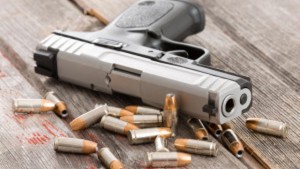 The Trinidad and Tobago government has piloted legislation aimed at denying bail for up to 120 days to anyone charged with possession of an unlicensed firearm or has a serious charge pending.
The Trinidad and Tobago government has piloted legislation aimed at denying bail for up to 120 days to anyone charged with possession of an unlicensed firearm or has a serious charge pending.
The amendment to the Bail Amendment Act tabled by newly appointed Attorney General Garvin Nicolas also denies bail for approximately the same period anyone charged with a serious offence and has used a firearm to commit the offence.
But opposition legislators have accused the government of electioneering and warned that a person could be denied his or her liberty by denying denied bail for one year on the basis of a charge.
Opposition People’s National Movement legislator Colm Imbert told legislators there were provisions in the legislation where no evidence is taken in relation to the charge against the person within 120 days, bail may be granted at the discretion of the High Court.
However he said if someone is charged under the new law with a firearm offence, from the time the trial begins that person has to wait one year to apply to a judicial officer for bail and therefore will be denied their liberty for one year.
“If a person is charged he is not guilty but the way this Government keeps spinning this thing, to justify the denial of liberty is that they pretend that as soon as you charge you guilty,” Imbert said, as he challenged the government to show where is the precedent for such legislation and whether it exists in the Commonwealth including India, the United Kingdom or Australia.
But Nicolas, who recently replaced Anand Ramlogan as attorney general, said that “firearms have become the weapon of choice to the criminally inclined in our society,” and that over the past 15 years citizens have lived in an unacceptable state of fear because of the high murder rate caused mainly by firearms.
The Bill requires a three-fifths majority for passage, and as such, requires Opposition support.
Nicolas said that 72 per cent of murders were caused by illegal firearms, while firearms accounted for 50 percent of wounding.
He said statistics showed that murders moved from a low of 93 in 1999 to 403 in 2014. On the other hand, wounding and shooting moved from a high of 801 in 2005 to 542 in 2013.
“The possession and use of illegal firearms ought to be a serious concern to all citizens,” Nicholas said, arguing that the denial of bail for the possession of fireman follows that of the denial of bail for 120 days for kidnapping and ransom and for gang members and gang-related activities.
He said the Kamla Persad Bissessar administration is asking for the denial of bail for the possession of illegal firearms because it understands that persons are innocent until found guilty.
But he said at the same time the government cannot deny the realities in which firearms are commonly used in serious crimes.
He acknowledged that while people will seek to exploit the deficiencies in the system and the police may well set up targets for their own ends, Nicholas said, “every police service has its bad apples and Trinidad and Tobago is no exception”.
However, he said the government and the Commissioner of Police are working to create a more efficient police service.
He added the government has increased penalties for police officers by virtue of amendments to the Firearms Act which provides for any police officer indicted for using his firearm illegally for up to 20 years in prison.
The debate is continuing.
